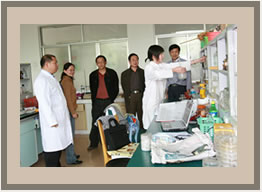The College of Life Science
consists of 5 departments: Department of Bioscience
and Technology, Department of Biochemistry and Pharmacy
Engineering, Department of Ecology and Environment,
Department of Agrostology, and Department of Food
Nutrition and Safety. The College offers out 7 undergraduate
programs: Biotechnology, Bioscience, Pharmacy Engineering,
Agricultural Resources and Environment, Ecology,
Agrostology and Food Quality and Safety. Moreover,
it has 9 postgraduate units authorized to confer
Master s degree in the following areas: Microbiology,
Food Science and Engineering, Botany, Biochemistry
and Molecular Biology, Pharmaceutical Chemistry,
Microorganism and Biochemical Pharmacy, Environmental
Science, Pedology and Plant Nutrition. s degree in the following areas: Microbiology,
Food Science and Engineering, Botany, Biochemistry
and Molecular Biology, Pharmaceutical Chemistry,
Microorganism and Biochemical Pharmacy, Environmental
Science, Pedology and Plant Nutrition.
The College has enrolled
1,266 undergraduates and 310 postgraduates. It
has 115 faculty members, with 16 professors and
36 associate professors.
Aiming at cultivating high-quality personnel with
creative minds and practical skills, the College
attaches great weight to the development of undergraduate
programs and cultivation of postgraduates. It
strives to form an education model of  wide scope,
sound grounding and high proficiency wide scope,
sound grounding and high proficiency and pays
attention to the research and reform of teaching.
As for academic achievements, the College has
won 1 second prize of the Teaching Achievements
of Higher Education issued by the Education Ministry,
1 second prize of the National Teaching Reform
Achievements Award, 1 first prize of the Teaching
Reform Achievements Award, 5 second prizes of
the Provincial Award for Teaching Achievements
of Higher Education and 3 first prizes of the
Provincial Teaching Achievements of Higher Education,.
For many years, the College has supplied society
with numerous high-level professional personnel
with a solid academic foundation, broad scope
of knowledge, good intellectual aptitude, strong
practical capability and initiative spirit. and pays
attention to the research and reform of teaching.
As for academic achievements, the College has
won 1 second prize of the Teaching Achievements
of Higher Education issued by the Education Ministry,
1 second prize of the National Teaching Reform
Achievements Award, 1 first prize of the Teaching
Reform Achievements Award, 5 second prizes of
the Provincial Award for Teaching Achievements
of Higher Education and 3 first prizes of the
Provincial Teaching Achievements of Higher Education,.
For many years, the College has supplied society
with numerous high-level professional personnel
with a solid academic foundation, broad scope
of knowledge, good intellectual aptitude, strong
practical capability and initiative spirit.
|
The College, laying the greatest
emphasis on course development, has attracted
a large number of talented personnel of teaching
and scientific research, and thus laid a sound
foundation for its development. Now it has 2 Provincial
Key Disciplinary Areas: Science of Microorganism
and Phytophysidogy and Biochemistry, and 8 research
institutes: Institute of Biochemical Nutrition,
Institute of Caterpillar Fungus Resources, Institute
of Environment and Resources, Institute of Stony
Desertification, Institute of Grass Science, Institute
of Food Resources Development and Utilization,
and Institute of Water Resources. The College
and the Provincial Key Laboratory of Agricultural
Bioengineering, a lab affiliated with the University,
have jointly provided the platform of biological
technology. Thus, it has strengthened the disciplinar
|
|
 |
|
